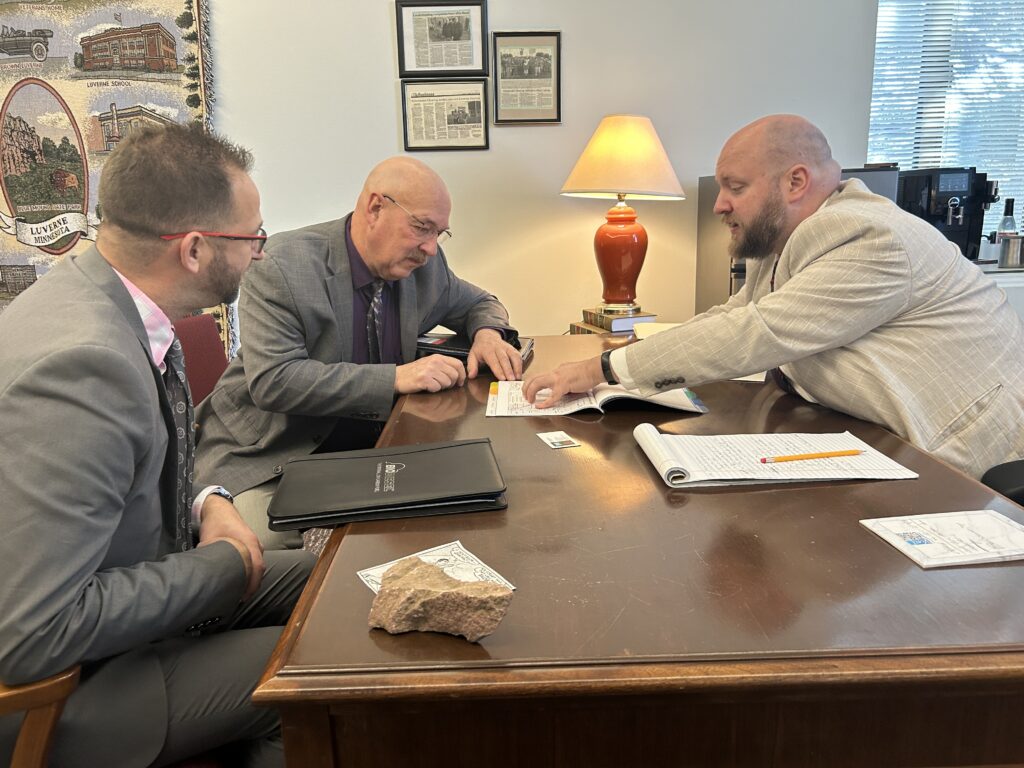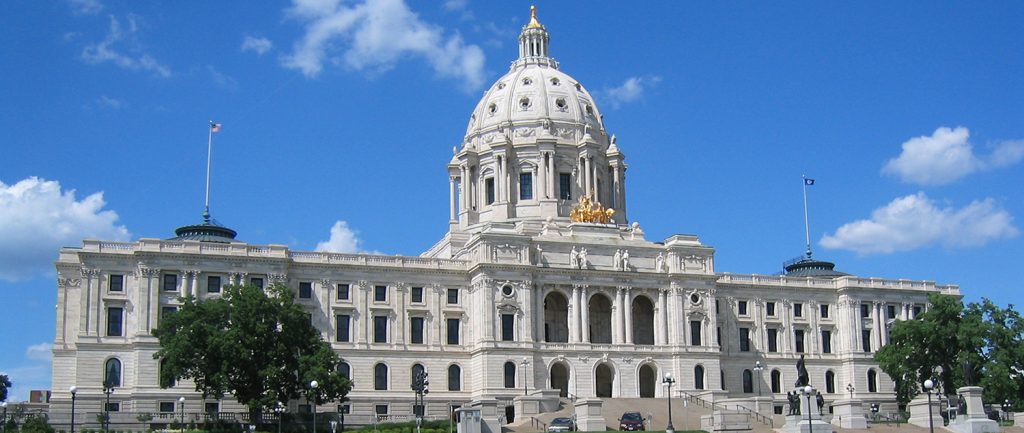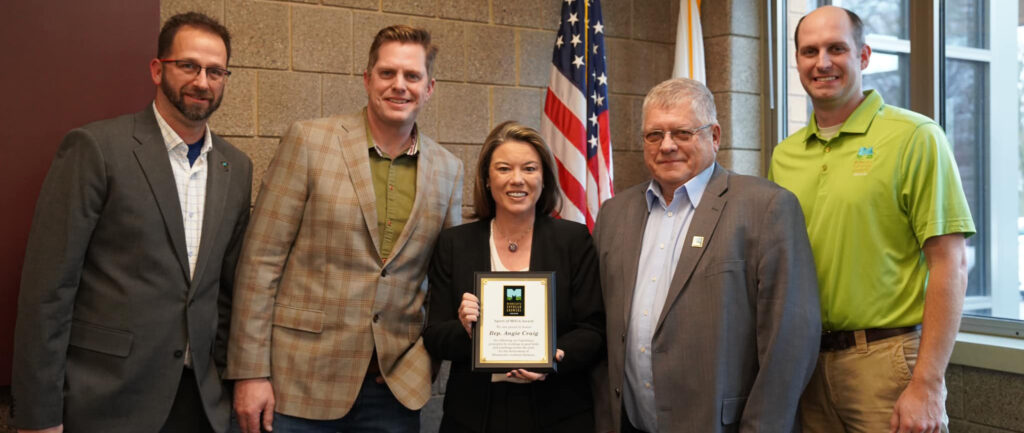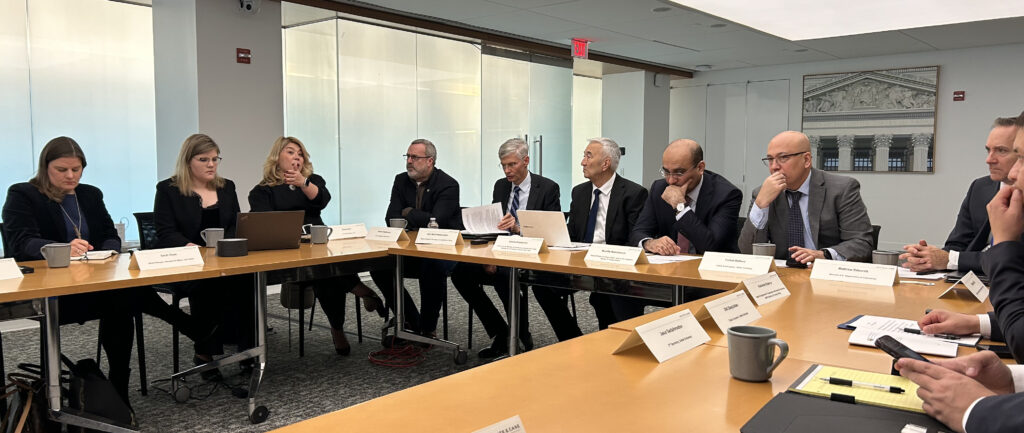The Minnesota Soybean Growers Association (MSGA) continues to keep a close eye on the latest legislative developments in St. Paul as the 2024 legislative session enters its final weeks. By being proactive and supporting a lobbying team that stays abreast of the daily happenings at the Capitol, MSGA has both promoted and defended ag-related policies on behalf of its members during the session’s first two months.
“It’s gone better than expected,” MSGA President Bob Worth said during the organization’s April board meeting. “We’re standing up for our members and working on all the issues that matter to agriculture and doing it by working with both parties and the Department of Agriculture.”
MSGA has remained engaged throughout the session, which began Feb. 12. Early in the session, MSGA hosted its Legislative Reception and Hill Visit and laid out priorities during meetings with more than 40 legislators across both parties.
“We got our topics that we wanted to discuss across, especially biodiesel,” Worth said. “We were also encouraged that they were aware of the problem we’re having with deer depredation, so we’re getting the word out. And it was a very encouraging sign that we got to visit with legislators who we’ve never previously met with.”
In early March, MSGA also visited the Capitol with Gov. Tim Walz to further emphasize its policy priorities. During the meeting, the governor said he wants to include ag groups in any discussion on a low carbon fuel standard.
“We need everyone at the table,” Gov. Walz said. “It’s super important that we make sure your voice is heard on the CTS (clean transportation standard).”
Following the Hill Visits, MSGA Executive Director Joe Smentek testified in both the House and Senate Environmental Committees that MSGA is concerned about proposed changes to the definition of public waters presented by lawmakers.
In 2015, the Legislature considered this exact scenario when then Gov. Dayton announced his buffer proposal. In discussing which waters needed buffers and which did not, the drafting of a law that was clear enough to be enforced and not unconstitutionally vague was shown to be quite difficult. MSGA members can’t walk out of the front doors and determine if a creek or pond drains two square miles. The Legislature recognized this in passing the Public Waters Inventory. This makes it clear and simple for a landowner to ascertain whether a water is a public water or not. The bill would go against that and create regulatory uncertainty, Smentek said.
“This definition doesn’t provide (clarity),” Smentek told the Committee. “This (bill) doesn’t give our members any more tells whether to ascertain clearly whether something that’s next to their land is a public water or not.”

The second would require disclosure of drain tile on ag property at the point of sale. After several discussions with MSGA and Minnesota Corn, the author agreed to an amendment that MSGA feels moves us in a better direction than the original language. There is still much work to be done on the bill language. However, everyone involved, including bill authors, agreed to ongoing discussions. Both bills were laid over for future action.
Budget matters
In March, Gov. Walz released a $226-million supplemental budget proposal.
Supplemental budget items of interest to agriculture include:
• $4 million to the Agricultural Growth, Research, and Innovation (AGRI) program to support Minnesota’s dairy and livestock industries, including Livestock Investment Grants and grants for meat, poultry, egg and milk processing.
• $3 million for in-home water treatment systems to remove nitrates from drinking water. This funding will be for private domestic wells with elevated nitrate and targeted to residents with a demonstrated financial need who could not otherwise afford to treat water or purchase an alternative drinking water source.
• $1 million in Clean Water funds to accelerate progress already being made in implementing the Nitrogen Fertilizer Management Plan.
• Extending the sunset date for the Agricultural Fertilizer Research and Education Council (AFREC) by five years, as well as the authority to continue to collect the fee on bulk fertilizer sales, which is used to support the Council.
In early April, the Senate passed the Omnibus Agriculture Policy Bill. The bill, authored by Committee Chair Aric Putnam, DFL-St.Cloud, largely comprises Minnesota Department of Agriculture policy bills that are noncontroversial and technical.
Policy items of interests to MSGA include:
• Amending the grain indemnity program
• Modifying the fertilizer and pesticide definitions
• Changing the definition of SAF to include recent technologies
The House Ag Committee didn’t move its own bill; thus, the Senate omnibus agriculture policy bill will likely conferenced with the House after both bodies approve supplemental agriculture finance bills.
MSGA continues working on agriculture exemptions for paid sick time, which passed in 2023, along with advocating for a working group to study the effects of deer depredation on crops. The Legislature is expected to pick up the pace in the closing month of the session, which ends May 20.
Additional MSGA 2024 policy priorities include:
- Adopting B100 in state trucks, especially snowplows
- Protecting prime farmland
- Tax relief
- Promoting the Port of Duluth-Superior
- Bonding (rural infrastructure)
- Water issues/soil management
- Value-added agriculture
- Invasive species
- Ditch mowing
- Rural health care
- Protecting against animal diseases
- Nitrogen management
To stay engaged on MSGA’s policy activities, become a member today by visiting mnsoybean.org/msga/invest/. MSGA members receive exclusive policy updates from lobbyists and directors and receive the MSGA Bulletin e-newsletter.
“We want to end the session strong,” Worth said, “and every member counts. The more members we have, the stronger our representation is.”




